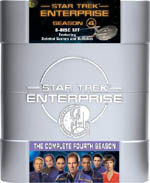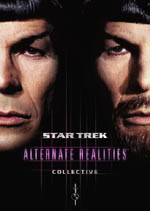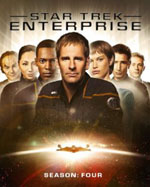94-95: In a Mirror, Darkly
In perhaps typical fashion for its fourth season, "Star Trek: Enterprise" delivers
another big, action-packed spectacle with this mirror universe two-part blockbuster. But while
it certainly holds one's eye to the screen, it utterly fails to make me care about anything
that happens in it.
The problem goes right back to the ill-fated decision to do a prequel series, and park "Enterprise"
in Star Trek's past while making up episodes on the fly week after week. Today's story wants to
logically further the franchise's Mirror Universe saga, but the writers admit in the interviews
they were stumped at how to avoid pre-empting Captain Kirk's initial discovery of this universe in
"Mirror, Mirror". Suddenly they got excited at the solution
of not bothering to allow any of their regular NX-01 castmembers to cross over into the other universe
and interact.
But just as this solved one problem, it created another that was possibly even bigger.
Without one or more regulars from the "good" universe coming over to interact with the endless
supply of "negative" versions of everyone we used to know, I found it impossible to find any
characters that I wanted to root for in this story, and was pretty much turned off by everyone
that I did see. In fact, this was quite an acute problem the first time I watched this.
Nothing in the story actually tells the audience NOT to EXPECT a tried and true regular coming over
to this universe at some point. I literally remember very consciously waiting for such a character
to appear, waiting for the cross-over event to occur, waiting to invest in a real protagonist
upholding some ideals against the rest of the nut-jobs in this mirror universe.
Even after most of the first episode had gone by, it began teasing us with a ship that had come
from our good universe, keeping hopes alive for finally getting that cross-over participant
in whom I could make an emotional investment. I waited for two episodes, remaining detached
the whole time, and got nothing. A serious fumble from the writers.
What we did get from the characters of this universe were all the usual dynamics
of an all-round lower philosophical standard. It fits the pattern that we ALL create our
own realities, in the sense that there are still some characters here that are more
sympathetic than others, but in this universe that sympathy is often created solely by
showing them as the underdogs in some brutal situations. The minute that the situations
reveal a bit of a reversal, previously sympathetic characters typically act as nasty
as their former overlords, revealing that they were merely bottling up their bad qualities
under the surface.
In particular I want to call attention to the sheer number of torture scenes on display here.
Television in general seemed to have developed an affinity for doing too much of this around this
time, and I emphasize how much of a turn-off it is. I don't want to see it. I don't find such
scenes to be anything approaching great character material. To me, it indicates that a writer
has painted himself into a corner by creating characters who are too much at odds with each other
and can't find more elegant ways to communicate. And it is a bit disturbing to notice how often
torture has turned up in Mike Sussman's scripts for "Enterprise" over the past two years.
This story indulges deeply in the trend, and it becomes another of the big turnoffs for the tale.
Something that is perhaps a bit more ambiguous is the sheer number of references to other
stories of the franchise. Sure this tale seems to be based primarily on the dark universe
concept of "Mirror, Mirror" and its five sequels on Deep Space Nine, a universe which has also
roped in The Next Generation and Voyager if we expand to count some of the novels that are officially
non-canon. But in reality, this one is less a "Mirror, Mirror" prequel and more of a sequel
to "The Tholian Web" - a rare highly-regarded episode from the original series' third season.
But it doesn't stop there. "In a Mirror, Darkly" also ropes in a twist on
"Star Trek 8: First Contact" and threatens to pre-empt
the original series first season episode "Arena".
Being a long-term Trek fan at this point, I could roll with these punches and enjoy them
to some extent. But the story seemed to be jumping from one of these items to another,
almost as if to say, "Let's see what other recognizable things from past/future we can cram in here!"
I don't know what could possibly be made of all this by the casual viewer, or even one who
only got into "Enterprise" specifically. It seems to have generated more of a mess of continuity
and references rather than an actual good adventurous story.
One thing I did really like was the presentation of the Tholian life-form, which both pays homage
to the very limited and funky graphics that TOS was able to achieve in the 1960's while also expanding
the creature conceptually and visually into something much more believable for today's audience.
Nice also that this creature requires a completely different atmosphere and temperature than Humans do,
which is something seen all too rarely on modern Star Trek. Perhaps imagination really was
encouraged far better on the early days of TOS and TNG than later on in the modern era.
Another attempt is made for another creature later on, which is also worthy and interesting
but a bit less successful I think.
Of course, one of the biggest attention-grabbing stunts is the extensive realization
of the U.S.S. Defiant - not the now more famous ship from DS9 but the one from "The Tholian Web",
identical to Kirk's own infamous ship. Attention to detail in recreating the ship is quite magnificent,
and it seems the designers even successfully extrapolated the design aesthetic to show us portions of
the familiar Constitution-class starship that we had never seen before. Excellent. All that said,
the cinematography while on board is decidedly not a recreation of the 1960's, as had been done on
"Trials and Tribble-ations", but one which continues to follow
the darker, grittier tones established for Bakula's series. Thoroughly appropriate in this case.
Less appropriate seems to be the characters' collective decision to change into the clothes
of their future and our past, getting into the 1960's Star Trek costumes. On one level, it's cute,
but cute isn't really their style, and finding good motivation for doing it would be a huge stretch.
Meh.
At least Sevol wears a beard in this universe, a nice tasteful salute to Spock's alternate
that still seems appropriate and in-character.
The end of the show somehow just seems to "be there". There is yet one more unexpected
twist in a long series of twists for this story.... but it doesn't seem to end in any kind of
a definitive place. It ends because its two TV "hours" are up. One might have hoped for
a reset-button to have disarmed these crazies and removed any anachronisms, but that wasn't
forthcoming. Was there any other positive goal whose completion the audience was meant to look
forward to? It seems all the conflicts of this place are just festering wildly with no resolution
in sight. It's a sad end for the Defiant, and a bit of a waste of another two slots in
Star Trek's ever dwindling schedule.
And I have to scratch my head and wonder if the writers really did avoid messing up continuity
in this tale. Events in the normal "good" universe seem to be untouched, and if anything
"The Tholian Web" works even better now that some of its more mysterious bits have been more
fully motivated and fleshed out by events in this tale. But what of the mirror universe itself?
Are we to believe that these people are so backward that the only way they could achieve a technology
on par with Kirk's time was to steal it 100 years too early? Perhaps a bigger problem is
Star Trek's fascination with the idea of two polar opposite universes, instead of the more
likely scenario of countless trillions of universes, spawning at every diverging moment of decision.
This could easily NOT be the same universe that links up to the one in "Mirror, Mirror"
and if healthy theories were followed, that's actually a more likely scenario, and also one
that frees the writers up to involve NX-01's regular characters and keep the stakes here
unpredictable.
In the end, "In a Mirror, Darkly" has been a bit of a mess, and an uninspiring one, although
one that still manages some excitement, interesting visuals, and production value. But it's another
two episodes gone by without any furthering of the stories of our regular NX-01 crew, and this
late in the game, that is a strange thing to see indeed.
Read the next In-depth Analysis Review:
"Demons / Terra Prime"
|
|








 slimline
slimline



